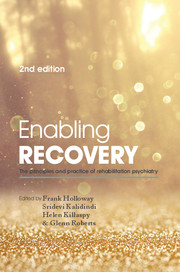Book contents
- Frontmatter
- Contents
- List of contributors
- List of figures, tables and boxes
- Preface
- Part 1 Setting the scene
- 1 Rehabilitation in a historical context
- 2 What is psychiatric rehabilitation?
- 3 Rehabilitation as a values-led practice: the contribution of recovery, social inclusion and personalisation
- 4 A comprehensive approach to assessment in rehabilitation settings
- 5 Understanding madness: a psychosocial perspective
- 6 First-person narratives
- Part 2 Treatment approaches
- Part 3 Key elements of a rehabilitation service
- Part 4 Special topics in psychiatric rehabilitation
- Part 5 Future directions
- Index
3 - Rehabilitation as a values-led practice: the contribution of recovery, social inclusion and personalisation
from Part 1 - Setting the scene
Published online by Cambridge University Press: 02 January 2018
- Frontmatter
- Contents
- List of contributors
- List of figures, tables and boxes
- Preface
- Part 1 Setting the scene
- 1 Rehabilitation in a historical context
- 2 What is psychiatric rehabilitation?
- 3 Rehabilitation as a values-led practice: the contribution of recovery, social inclusion and personalisation
- 4 A comprehensive approach to assessment in rehabilitation settings
- 5 Understanding madness: a psychosocial perspective
- 6 First-person narratives
- Part 2 Treatment approaches
- Part 3 Key elements of a rehabilitation service
- Part 4 Special topics in psychiatric rehabilitation
- Part 5 Future directions
- Index
Summary
Introduction
Developments in rehabilitation practice and services have arisen in reaction to prevailing social attitudes and norms, scandals and crises in care, and in pursuit of improvements for the life experience of people with severe and complex mental health conditions. The language and concepts given to these initiatives have changed over the years, keeping pace with shifting therapeutic philosophies and social policy. Current approaches are built upon the legacy of innovations, which include: moral treatment, deinstitutionalisation, social role valorisation, strengthsbased approaches, normalisation and community care. Each in its day arose from a struggle to reconcile humanitarian ideals with the care and treatment of people with disabling mental illness. Each was a reaction to well-documented limitations and failings in the quality of services, and each pushed for progress and flourished for a while before losing popularity and momentum, and, like waves upon a beach, receding in impact and influence until overtaken by a successor. Few, if any, of their advocates would be fully satisfied with what they achieved or would have regarded these ‘movements’ as having fulfilled their potential. But the wider impression, albeit with setbacks and less favourable periods, is that the tide has been steadily coming in and there has been an increasing ethical impetus towards social justice, respect, inclusion, integration and acceptance for people with severe and complex mental health problems, in open society, as fellow citizens.
A notable recent contribution has been publication of the Francis report into the failed care, excess suffering and death of vulnerable, mostly elderly, people in physical healthcare in mid-Staffordshire, which has given further momentum to (and renewed public concern about) the need for compassion, kindness and person-centred approaches to healthcare (Francis, 2013).
In among the complex details of service evaluation, the emerging standard is, ‘Would you regard the service you work in as good enough for your own friends and family’? There are undoubtedly services that do exemplify good practice, but recurrent inquiries by regulators, user-led reports (MIND, 2011) and independent commissions (Rethink, 2012) have noted that this remains patchy and that there continue to be concerns over the quality of many services and the outcomes experienced by the people they serve.
- Type
- Chapter
- Information
- Enabling Recovery , pp. 39 - 60Publisher: Royal College of PsychiatristsPrint publication year: 2015

